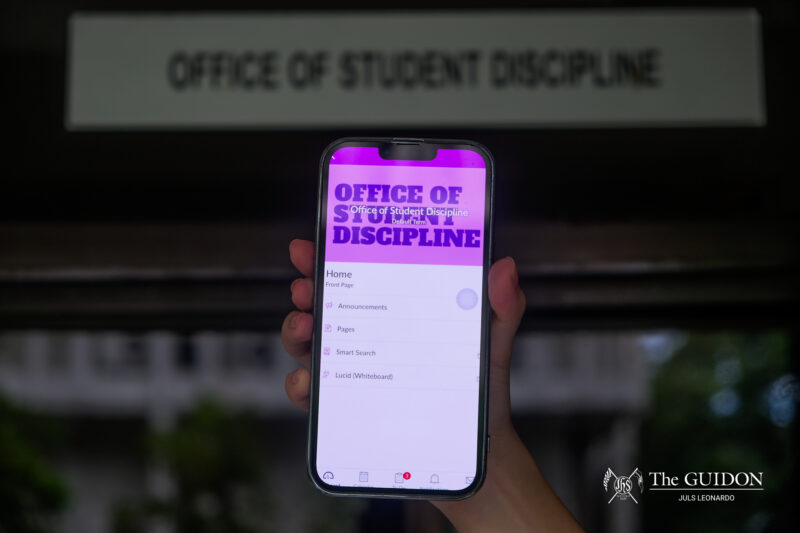WITH ONLY a few months left before the 2013 midterm elections, the projects of the Ateneo Task Force (ATF) 2013 have been getting mixed results.
The task force aimed to engage Ateneans to participate in the elections through a master plan with four phases: voters’ registration, voters’ education, mock elections and voters’ mobilization.
ATF 2013 Head Ian Agatep said that while there are students who do care about voting, there are others who veer away from the idea because they see it as a hassle and do not consider politics as their priority.
He said that ATF 2013 tries to show the impact of voting. “It’s also about looking beyond the voting itself because after the elections, that’s where the actual thing counts, that’s where the good governance comes after, that’s when the projects and the policies come and, hopefully, they see it also in that way.”
From aware to involved
Agatep said that the difficulty in attaining their goal is in getting the students to know that political engagement and active public participation are good for them.
“There’s a study by A-Stat [Ateneo Statistics Circle]… [that shows] that students highly give importance to what the elections mean, but it doesn’t really translate into maybe registering [or] supporting activities.”
He said that maybe what is important is for Ateneans to be more involved instead of simply being aware.
“Hopefully, during May 13, students are able to see that it’s not only forming our government but it’s also forming them because whoever are seated there are the ones going to dictate which policies are going to be made.”
Agatep added, “If we continue to support certain bills that have been passed… if we’re so adamant and so vocal about that, why not be so vocal about the elections? Because the elections will bring about the actual laws that we want prepared.”
Recapping the phases
Currently, the first three phases of ATF 2013 have yielded results of varying success.
About 20 to 30 Ateneans residing in Quezon City participated in the two batches of Hakot Registrations. The goal was to have at least half of the 5,082 first-time voters registered. The Hakot Registration for Marikina was called off due to the fewer number of people who signed up.
Voters’ Registration Head Chris Cunanan said that a lot of students wanted to join. However, they were not able to meet their target number after encountering several problems.
The first phase had timing issues since its launch was affected by the southwest monsoon in August. As a result, four registration days were scrapped in the first week.
The schedules of those who signed up and the time it took for the registration to be completed sometimes did not match. There were times when the whole process only took 30 minutes, but sometimes it went on for as long as half a day.
Moreover, some students were not willing to cut classes for reasons such as recently announced quizzes. Some latecomers decided not to join anymore.
There were problems regarding promotions since sign-up sheets got released late. About 50 to 60 signed up for the Hakot Registration, including those who chose dates affected by the southwest monsoon and those who live in Marikina.
But because of the lack of resources, the satellite registration did not push through. “[Comelec didn’t] find it feasible to send their computers in schools and then the number of registrants would be [fewer] than what they would have been able to register on-site,” Cunanan explained in a mix of English and Filipino.
ATF 2013 was one of the organizers of “Sabay sa Bayan: 2013 Senatorial Forum” in which seven senatorial candidates were present. The forum was covered by media outlets and became a Philippine trending topic on Twitter last February 8 with the hashtag #SabaySaBayan.
The second phase of ATF 2013, the voters’ education phase, had already held two talks. “Bakit Boboto? Does a Single Vote Matter?” last August 24 featured Marites Vitug of Rappler.com, Vanessa Bolibol of Kabataan Partylist and RR Rañeses of the Political Science Department.
“Representation in Question” last December 10 featured speakers from the Alliance of Concerned Teachers, Ang Ladlad and Pilipinos with Disabilities.
Roughly 200 students voted in the mock elections, a satisfactory figure for Agatep, although he said it could have been much better. About 300 voted in the 2010 mock polls and the target was to match it.
Mock Elections Head Ray Lacsamana said that while a number of people responded to the mock elections, others did not have the time to vote, either because they were already going home or were finishing school requirements.
He also said that there was confusion on the goal of the mock elections. “It’s to know who and what the Ateneans want, not just who and what the Ateneans who will vote this 2013 want,” Lacsamana said in Filipino. “The target wasn’t just the registered voters but also the non-registered voters.”
Summer edition
ATF 2013 is now working on the transition to Voters’ Mobilization. With regard to nonpartisan volunteer work, Agatep said that they are currently looking at the Parish Pastoral Council for Responsible Voting (PPCRV) and the recently accredited National Citizens’ Movement for Free Elections (Namfrel).
“Depending on what Namfrel would do, we’re hopefully focusing on what volunteers they would need. Because in recent times, what I heard was that Namfrel was going to focus on auditing of campaign finances as compared to real citizens’ arm na poll-watching and concerns,” he explained.
For partisan volunteer work, ATF 2013 is looking into the campaign teams of different senatorial candidates.
“The campaign teams, we can invite them here and hopefully we can get students be involved in this because if there are students who are already open into understanding that ‘I want to be part of this senatoriable’s team’… then why not?” Agatep said.
“We also agree that it’s part of the political maturity of the students that they understand that they stand for the advocacies of a certain senatoriable.”






